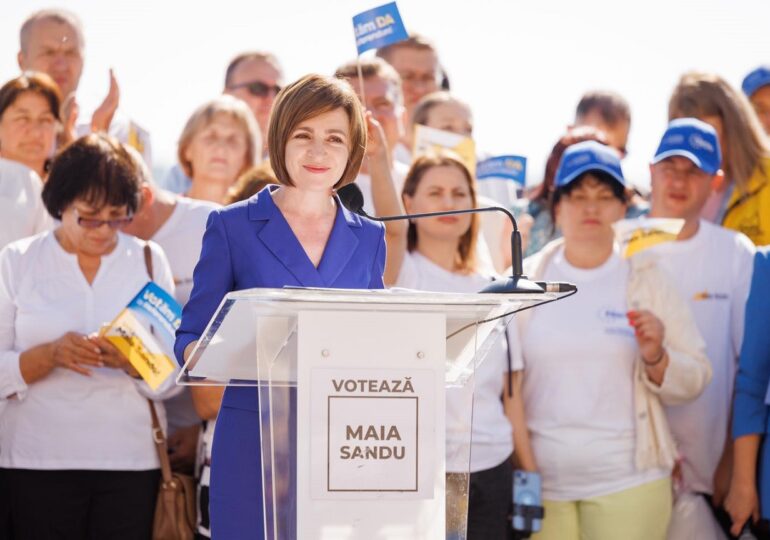In addition to the presidential elections in the United States, there are elections in several Eastern European countries that could have significant effects not only domestically but also on the continent.
In four Eastern European countries, elections are scheduled by the end of the year, and these could affect the local and European geopolitical landscape, including the future of Ukraine. The importance of the elections in these countries is confirmed by the detection of pro-Russian elements attempting to influence electoral campaigns and voting results in these countries.
Although only two of these countries - Romania and the Republic of Moldova - are neighbors with Ukraine, the elections in Bulgaria and Georgia could also have a direct impact on the country invaded by Russia, notes Kyiv Post.
Here, in chronological order, are the Eastern European countries where elections will take place by the end of this year:
Republic of Moldova
Elections and a referendum for the country's accession to the EU are set to take place on October 30. Pro-European President Maia Sandu aims to secure a second term. Her rival, former Prosecutor General Alexandr Stoianoglo, promotes a neutral agenda and is supported by the Socialist Party, a traditionally pro-Russian formation.
In January, Chisinau stated that Moscow is attempting to destabilize the country through the Transnistria region, supported by pro-Russian separatists. Moldova has also accused Moscow of interfering in elections by bribing voters.
The separatist region of Transnistria, bordering the Ukrainian region of Odesa, remains a concern for Kyiv, with 1,500 Russian soldiers stationed there who could pose a threat to Ukraine in the event of a pro-Russian victory in the elections.
On the day of the presidential elections, Moldovans will also vote in a referendum on the country's EU accession. The European bloc initiated accession talks with Ukraine and Moldova in June.
According to a CBS-AXA poll cited by Reuters, Maia Sandu is likely to win a second term, with 63% of locals supporting the country's EU accession.
If none of the candidates secure 50% of the votes, a runoff will be held on November 3.
Georgia
Parliamentary elections in this country are scheduled to take place on October 26.
The election marks the first major political event after the authorities in Tbilisi adopted the controversial "Foreign Influence Law," proposed by the ruling party Georgian Dream and modeled on similar legislation in Russia.
The law has led to Western sanctions and the suspension of Georgia's EU accession process.
Opposition leaders have criticized the pro-Russian stance of the Government, despite Moscow's invasion of the country in 2008. The absence of Georgian sanctions against Moscow following the invasion of Ukraine has allowed an influx of Russian citizens and capital into Georgia. Some of them have used Georgia to circumvent Western sanctions against Russia.
According to the Foreign Policy Research Institute, an American organization, the upcoming elections are "less predictable" than previous ones. A victory for Georgian Dream would likely trigger widespread protests and further deterioration of relations with the West.
On the other hand, a victory for the Opposition, considered unlikely but possible by the cited organization, could bring Georgia back on the path to EU and NATO accession negotiations, but would also have repercussions on relations with Moscow, given the economic ties with Russia promoted by the ruling party.
An Opposition victory would symbolize a triumph against Russian influence in other post-Soviet states. The pro-Western Opposition would likely reduce trade and material transfers to Russia, further degrading Moscow's ability to finance its war in Ukraine.
Bulgaria
Parliamentary elections will take place on October 27. It will be the seventh election in four years after another attempt to form a government failed.
"However, in a series of six early elections, only two have produced an elected government, and both collapsed after reform-oriented politicians tried to end the country's energy and security dependence on Russia," according to Euronews.
Voter fatigue due to the perpetuation of the political deadlock in this country has led to a decrease in voter turnout, with electoral campaigns still being affected by accusations of political propaganda and interference. Bulgarian President Rumen Radev stated last week that some parties have bought votes, also accusing authorities of selective enforcement. There have been reports linking corruption to elements of Russian influence.
As a NATO member, Bulgaria has largely supported Ukraine and provided arms to Kyiv. Additionally, Sofia holds a unique position as one of the few NATO members that have continued the production of Soviet standard ammunition used in Ukraine. However, Bulgaria's efforts have been hampered by alleged Russian interference – including sabotage acts against Emco, a Bulgarian manufacturer producing Soviet ammunition - likely coordinated by Russian intelligence services.
Although the election results are unlikely to influence Bulgaria's support for Ukraine, the proliferation of pro-Russian elements could still theoretically undermine this country's assistance to Ukraine through sabotage or disinformation.
Romania
Presidential elections will take place on November 24, and parliamentary elections on December 1,
"Romania is also a NATO member state and a key player in defending NATO's eastern flank, currently building the largest NATO military base in Europe. It also hosts F-16 training for Ukrainian pilots," notes Kyiv Post.
In Romanian politics, there are also far-right elements with a pro-Russian stance, such as SOS Romania, a small ultranationalist and Eurosceptic opposition party, as mentioned by the cited publication, recalling the exclusion of Diana Șoșoacă from the presidential race by the Constitutional Court, a decision that sparked controversy.
"Although the current administration has supported Ukraine, current pro-Western President Klaus Iohannis is obliged to step down after his current term – and with the increasing anti-Ukrainian sentiment earlier this year regarding agricultural disputes, it is possible that the country's support may decrease if far-right elements gain traction in the upcoming elections," writes Kyiv Post.

